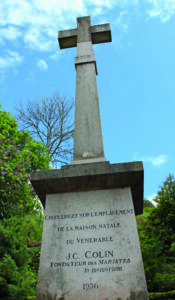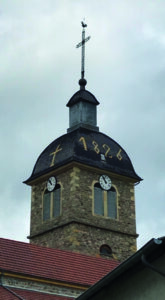Celebrating Fr Colin’s Birthday
7 August
Text by the Editor
Photos: Fr Ron Nissen SM
Jean-Claude Colin, the founder of the Society of Mary, was born on 7 August 1790 in Barbery, in the Beaujolais region of central France. He was the eighth of nine children born to Jacques Colin and his wife Marie, née Gonnet. The other children were Claudine, Jean, Mariette, Sébastien, Jeanne-Marie, Pierre, Anne-Marie (who died at birth), and Joseph. The two eldest children were his godparents, and he was named Jean-Claude after them. The family home, where he was born, no longer exists. A memorial cross erected in 1936, the centennial year of Rome's approval of the Society of Mary, marks its site.
Jean-Claude’s parents owned and worked a section of land and turned their hand to weaving during the winter.
The Civil Constitution of the Clergy, promulgated after the French Revolution in 1789, had the effect of making the Church a State department. Some priests and parishioners supported the Constitution, while others remained faithful to Rome. The situation split the Church.
Jacques and Marie Colin supported the clergy loyal to Rome, one of whom was their parish priest, Fr Benoît-Marie Cabuchet, to whom they gave shelter. The civil authorities issued an order for the arrest of Jacques Colin, so in 1793 he went into hiding, sleeping rough and often on the run. Government agents seized the family's vineyard and wine, as well as their furniture, and boarded up their house.
Robespierre’s fall from power in July 1794 and the end of the Reign of Terror brought relief. Jacques Colin received a pardon, and the property confiscated the year before was returned.
Both Marie and Jacques had been worn down by the suffering and worry they had endured. Marie died on 20 May 1795, aged thirty-seven. Jacques, forty-eight years of age, died less than three weeks later, on 8 June. Jean-Claude was not yet five years old when both of his parents died in less than a month.
The Church in which Jean-Claude was growing up was persecuted, mocked and scorned. It was a church of martyrs for the faith, and among them, Jean-Claude would count his parents.
Jacques’ only surviving brother, Sébastien Colin, a bachelor, became the guardian of the youngest children: Sébastien, Jeanne-Marie (Jeanette), Pierre, Jean-Claude and Joseph. Sébastien was thirteen, and Joseph was two and a half.
Sébastien senior employed Marie Échallier as housekeeper. She stayed with the family for eleven years, helping to raise the children. Jean-Claude remembered her as a “good, very pious, very thrifty young woman” who “took the place of a mother” (Kerr, p 35), was “esteemed but feared” by the children (OM 3, 889:2), and was very strict in religious matters.
Jean-Claude’s education was also helped by ‘Sister Martha,’ who ran a school in the village which the Colin children attended. Not much is known about her, but she was most likely a former religious expelled from her convent during the Revolution. It is also most likely that she was Marthe-Marie Plasse, who was born in Saint-Bonnet in 1778. Sister Martha taught writing, reading and religion.
The peace of 1795 lasted only until September 1797, when priests who refused to take an oath of hatred of the monarchy were hunted, and Fr Cabuchet had to go on the run again, ministering to his parishioners in secret. Jean-Claude remembered the excitement of Masses celebrated in barns in the dead of night and of making his first confession among the looms in a weaver’s workshop.
When Jean-Claude was about eleven years old, Jean, his eldest brother, moved the family from the farm at Barbery into the village of Saint-Bonnet. The family home was next door to the church, which meant that Jean-Claude could easily visit the church.
A statue of Our Lady of Sorrows in the church had great appeal for him, and he also served Mass regularly. Towards the end of his life, he told his nephew Eugène how he and the other boys used to compete to be first to arrive at the church so they could serve Mass.
In his early teens in 1803, he received the sacrament of Confirmation. He then made his first Confession and Communion, as was the custom at that time.
The Church was the centre of Jean-Claude’s life. Very devout, he used to get up at night to pray, and he loved solitude. He later said that “All I thought of was to be a hermit, to go and live in the woods, to be alone with God” (OM 2, 499, addition i (Mayet, 1838-39)). He spent time in the woods at Le Crest, above the family home in Barbery, in the area where his father and Fr Cabuchet probably hid when they were on the run.
As well as playing at being a hermit, he also pretended to be a preacher, delivering sermons to the trees. When he was about seven, he would preach to other children, reciting the parish priest’s sermons or Sr Martha’s lessons from the top of a pile of stones.
When Jean-Claude's mother Marie was dying, she asked for a statue of Our Lady. Pierre Colin, Jean-Claude's brother, recalled that his mother was greatly moved as she held the statue and begged the Blessed Virgin to be the mother of the eight children she was leaving behind. Jean-Claude wept as he remembered and spoke of this in 1842. All through his life, Jean-Claude considered Mary to be his mother and was utterly devoted to her.



 Entries(RSS)
Entries(RSS)